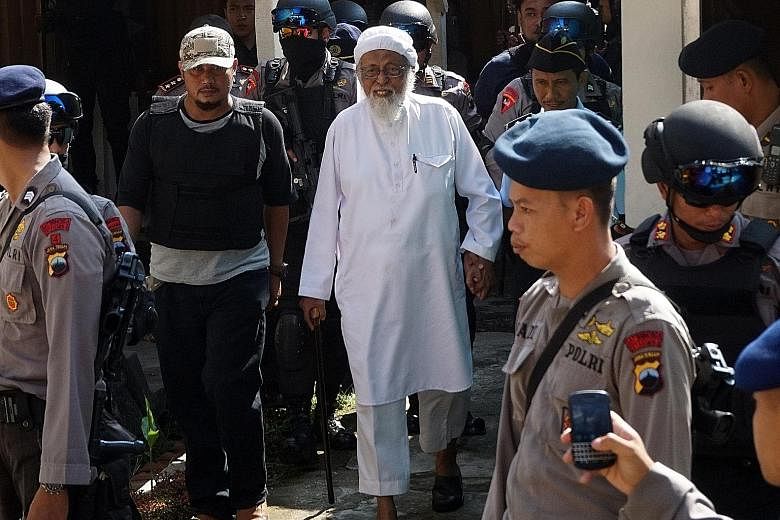The Indonesian government is mulling over a plan to allow the country's most influential militant cleric, Abu Bakar Bashir, to leave jail for good and be placed in home detention due to his deteriorating health, local media reported.
The Jemaah Islamiah (JI) spiritual leader was rushed to hospital on Thursday morning, guarded by elite police.
Bashir, 79, was sentenced to 15 years' jail in 2011 for inciting others to commit terror acts and helping to fund a paramilitary training camp in Aceh that the police raided the year before.
Local media reported Defence Minister and retired general Ryamizard Ryacudu as saying that the home detention option is a human rights gesture by the government. "Bashir as we know is old and sickly," Kompas.com. quoted Mr Ryamizard as saying.
Presidential spokesman Johan Budi told The Straits Times yesterday that "home detention, by law, is a possibility".
In April 2016, the authorities moved Bashir from the maximum security Nusakambangan island prison in Central Java, where he was locked in an isolation cell, to Gunung Sindur prison outside Jakarta.
The transfer of the founder of the South-east Asian terror network to the smaller state penitentiary near a major city was to ensure that he could receive proper medical treatment, the government said.
Mr Maruf Amin, the chairman of Indonesian Ulema Council, told reporters on Wednesday that he had appealed to President Joko Widodo to grant clemency to Bashir due to the cleric's poor health.
"On the clemency issue, up to now, I haven't received the application letter," President Joko said when asked by reporters yesterday. Under Indonesian law, an individual must first admit that what he had done was wrong, before being considered for clemency.
However, Bashir's lawyer Mr Fachmi Bachmid told The Straits Times: "We won't apply for clemency because clemency is a form of admitting guilt. It's certain that we won't do that.
"But we are asking for home detention. He is old and sickly. It is human rights," he added.
Mr Adhe Bhakti, a researcher at the Centre for Radicalism and Deradicalisation Studies, told The Straits Times that since Bashir is a terrorist ideologue, there are worries that he would again be able to spread radical ideologies.
"If a home detention option were taken, an 'isolation-cell' approach would still have to continue," Mr Adhe said, explaining that guests visiting Bashir would have to be limited to close relatives only.
The JI network, formed in the early 1990s by Bashir, was detected in 2001. Many of the Singapore JI members studied with him at a school he set up in Ulu Tiram in Johor. The group was behind 20 bombs that went off outside churches across Indonesia on Christmas eve in 2000. On Oct 12, 2002, two JI suicide bombers killed 202 people and hurt dozens in Bali.
In 2013, Bashir reiterated to his followers that the current Indonesian government is illegitimate as it is based on democracy, which Bashir described as "syirik", or idolatry.

